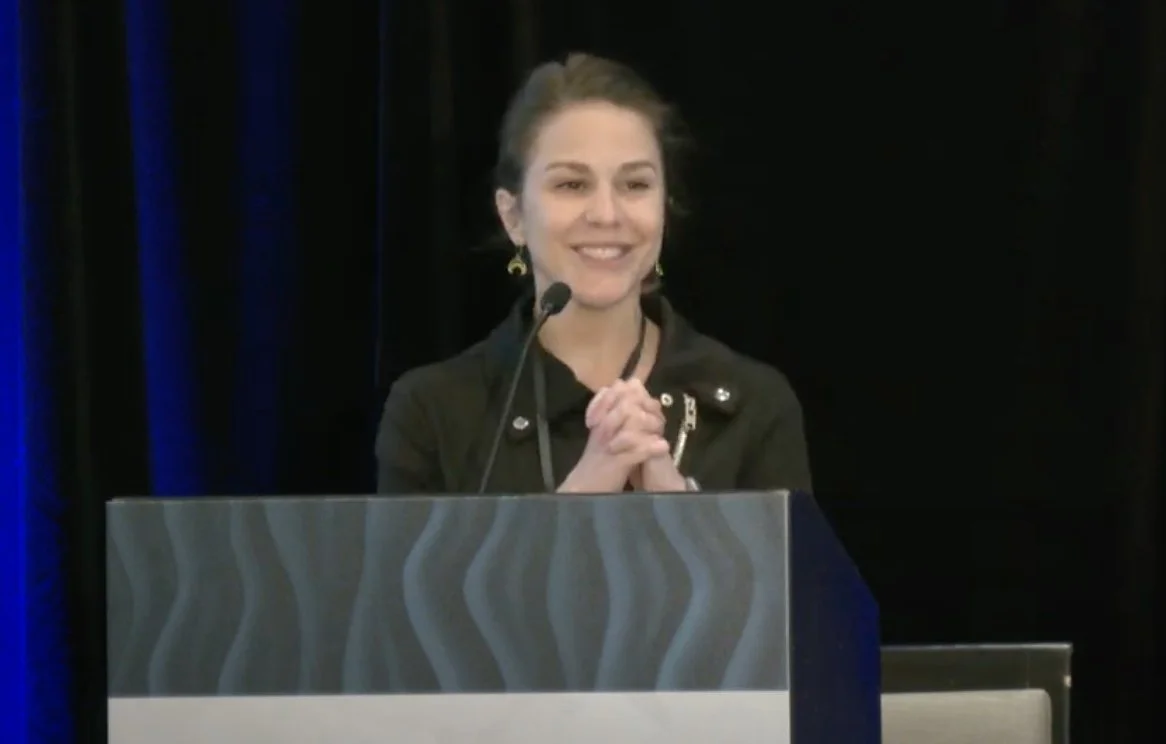A Multidisciplinary Team Includes the Patient | Integrative Care in Inflammatory Bowel Disease
Presented at the Multidisciplinary Approach to Managing IBD and Immune Mediated Diseases in Preconception and Pregnancy conference, held in Toronto on June 8, 2024. MCIBD is a Continuing Health Education initiative for health care providers who treat patients with Inflammatory Bowel Disease.
Montana speaks from the perspective of a patient who has lived with this disease for 18 years, and as an integrative wellness practitioner who regularly treats patients with the same condition. She speaks about the need for an integrative approach in medicine, particularly in IBD where there is a high prevalence of symptoms of anxiety and depression in patients.
Montana also highlights various self-regulation and stress reduction tools that can assist patients. She ends her presentation by touching on the concept of Post-Traumatic Growth, the positive psychological change that can be experienced after a life crisis or traumatic event.
Moving Beyond the Doctor's Perspective of the Patient's Perspective
I am very excited to share that an editorial I’ve co-authored has just been published in the Journal of General Internal Medicine: “Moving Beyond the Doctor’s Perspective of the Patient’s Perspective”. Along with Dr. Arnav Agarwal and Dr. Ariel Lefkowitz, this paper explores the ways in which physicians frequently fall short in including patients’ perspectives in medical care and what we can do to better elevate patients’ voices.
The three of us have been collaboratively working on this article for several years now. It is quite uncommon for someone like myself to be included in the research process for a major medical journal and for my personal struggles with our health care system to be highlighted in this way.
To say I am grateful for this achievement would be an understatement. I am particularly grateful to my dear friend and colleague, Ariel, for valuing my perspective and showing me what it means to be a person of integrity. It is one thing for a doctor to declare that she or he is dedicated to patient-centred care. It is a completely different thing for that person to truly listen and allow a patient’s voice to be elevated.
We are all patients and we are all healers. Privilege does not only exist along racial or gender lines. When we are in the role of a patient, oftentimes our voices feel silenced and our power revoked. It can be a terrifying and traumatic thing; I know it was for me. Healing comes when we find the others like ourselves, fighting for a better world.
All of our stories matter. Keep sharing yours and know that you are not alone.
Mental Health & Inflammatory Bowel Disease | Presentation and Guided Yoga & Meditation
I was recently invited by Crohn’s and Colitis Canada to present on mental health and wellness for young adults affected by Inflammatory Bowel Disease (IBD).
Watch below to learn self-care tips, be guided through mental health practices and experience the mind-body connection.
Mental Health and Self-Care for Cancer Advocates
Each of us becomes involved in cancer advocacy because we are deeply personally affected by the devastating impact of cancer.
How can we do our work effectively, while simultaneously caring for ourselves as we navigate triggers and intense emotions?
This workshop offers a variety of tips and tools to support ourselves and one another’s self-care and mental health. It includes education on trauma and the nervous system, gentle yoga, mindful breathing, journaling and group discussion on themes explored.
This workshop was presented at the Health EMatters Conference for cancer advocates, held October 27-29th 2022 in Toronto, Canada.
Each of us becomes involved in cancer advocacy because we are deeply personally affected by the devastating impact of cancer.
How can we do our work effectively, while simultaneously caring for ourselves as we navigate triggers and intense emotions?
This workshop offers a variety of tips and tools to support ourselves and one another’s self-care and mental health. It includes education on trauma and the nervous system, gentle yoga, mindful breathing, journaling and group discussion on themes explored.
This workshop was presented at the Health EMatters Conference for cancer advocates, held October 27-29th 2022 in Toronto, Canada.
Chronic Illness and Mental Health: Breaking the Vicious Cycle
When we face a chronic illness, it does not just affect the specific body part in isolation.
Oftentimes, we face a myriad of physical, mental, emotional and social challenges, and our Western healthcare system lacks the resources to guide us through this challenging time.
This is why it is so important for us to educate ourselves and learn how to break the vicious cycle, feeling empowered in our own care.
In this presentation, I outline my personal story and share tools and resources to help you navigate your way to health and wellness.
Thank you for listening, and I would love to hear from you!
Jelly Belly
When I was seven years old, I was diagnosed with acute lymphoblastic leukaemia. I was on chemotherapy for three years, from the ages of seven to ten years old. I should note here that I am incredibly fortunate. I was treated at one of the best children’s hospitals in the entire world. This diagnosis would have been a death sentence not too long ago.
Prednisone
One of the drugs that was part of my chemotherapy treatment is called prednisone. Prednisone is a synthetic corticosteroid. Corticosteroids have many effects on the body, but they are most often used for their potential anti-inflammatory effects, particularly in those diseases and conditions in which the immune system plays an important role.
Here is a list of a few of the many side effects and adverse effects of this (life-saving) drug:
Depression
Insomnia
Mood swings
Weight gain / ‘moon face’
High blood pressure
Muscle weakness
Nausea / vomiting
Impaired wound healing
Ulcers
Diabetes
Osteoporosis
Increased frequency and severity of infections
Retardation of growth in children
I was a young girl who was regularly taking a medication that made me unable to sleep, experience intense and frequent uncontrollable mood swings, and seemed to suppress my ability to feel full. I do not recall receiving any guidance or support in overcoming the emotional, psychological and spiritual challenges that this drug caused me over the years of my treatment.
Jelly Belly
Prednisone was only one of the medications used in my treatment plan to target the cancer cells. There was a little room I would go into where I would get what my family infamously called ‘the back needle’. I don’t need to go into detail about all the locations I received needles for you to get the idea that this process was difficult and scary. But the worst part for me was when they asked me to go on the scale.
My weight and height had to be tracked zealously. The nurses and doctors would make it abundantly clear: my height was too low and my weight was too high. I believed that I was to blame. In fact, there was a female oncologist at this hospital who had given me the nickname Jelly Belly. She probably thought it was funny and harmless. I felt an intense amount of self-disgust. I felt ashamed. I was so afraid. I couldn’t control my sadness or my grief or my fear. My life was spiralling out of control, and I believed that I had received the message loud and clear: if I lost weight, I would be good. I have always been a perfectionist with a deep desire to please those around me. I wanted to be a ‘good student’ at the hospital, and receive the message that I was finally an average height and weight. I was failing them, and I had to do better. I could not control my height, but there was something that I could control. I had to lose weight.
When Healthcare Leads to Suffering
When I look back on this story, it becomes abundantly clear how I developed an eating disorder by the age of eleven. I began carrying around a calorie book with me everywhere I went. I knew how many calories were in everything. The goal was to eat as few of them as possible.
At that point, the cancer treatment had ended. The long-lasting psychological toll it took was never addressed, as far as I can recall. When the emotional and mental health aspects of illness are not addressed, this can lead to immense suffering:
Here’s the thing about trauma: those who experience trauma do not allow themselves to forget. We re-traumatize ourselves over and over again. I was ten years old and my goal was zero calories per day. I was a hard-working perfectionist, and I became incredibly proficient at starving myself.







